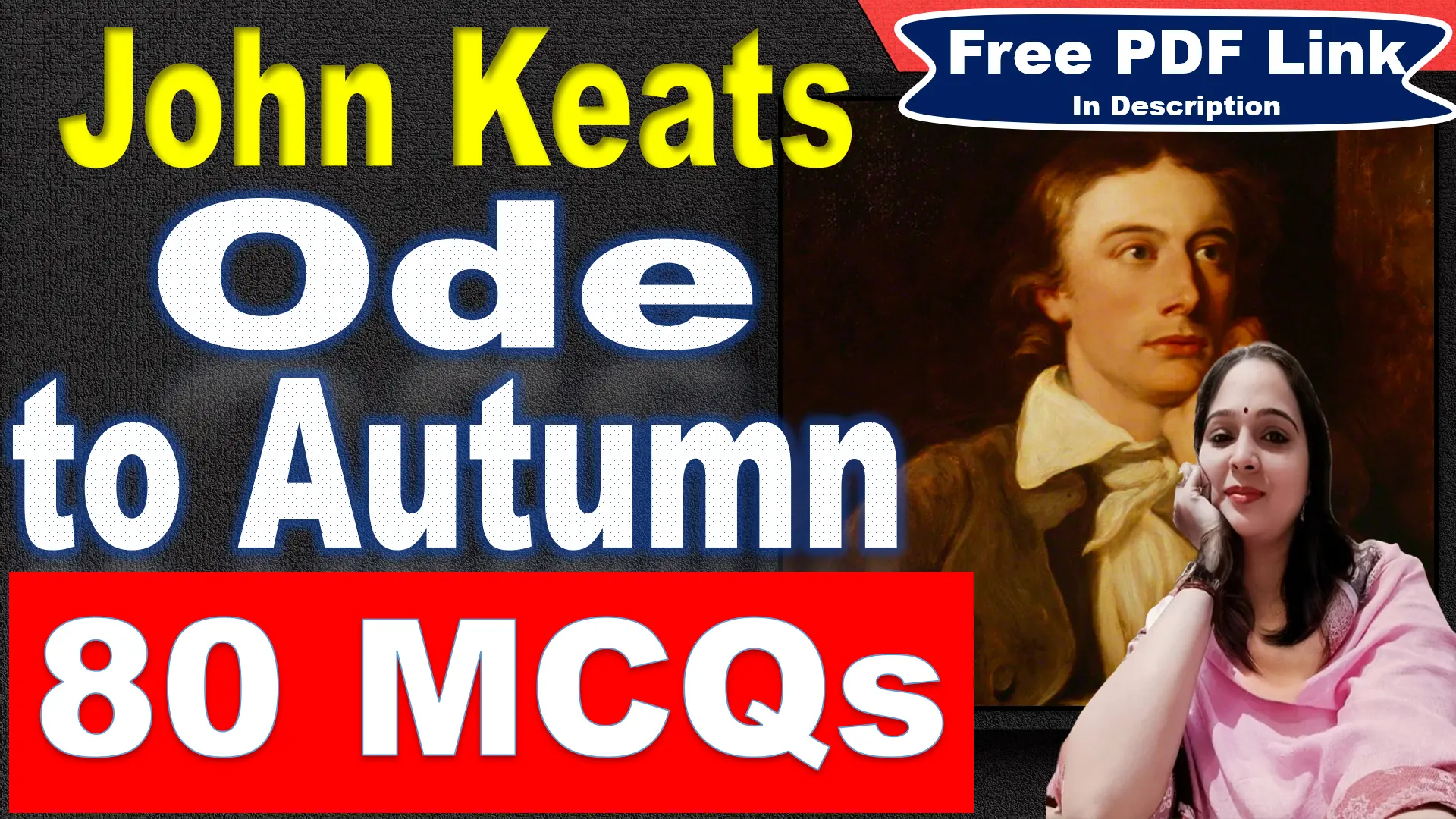
Essay Type Questions
Critical Appreciation of “The Visitor” by Nissim Ezekiel.
Introduction
Nissim Ezekiel’s The Visitor is a reflective poem featured in his 1976 collection Hymns in Darkness. The poem captures the tension between expectation and reality, focusing on themes such as anticipation, disillusionment, and the everyday ordinariness of life. As one of the most prominent figures in Indian English literature, Ezekiel masterfully blends philosophical reflections with everyday experiences in this poem, demonstrating his thoughtful and understated style.
Central Idea
The poem revolves around the speaker’s expectation of an important visitor after the appearance of a crow, a symbol often associated with omens. Immersed in folk beliefs, the speaker envisions a profound encounter—perhaps with a divine or morally challenging presence. However, the reality of the visitor is trivial, leading the speaker to reflect on the dissonance between life’s ordinary events and the transformative experiences we often expect. The poem underscores how our heightened expectations can lead to disappointment when faced with the mundane realities of life.
Structure & Rhyme Scheme
The Visitor is written in free verse, which forgoes a formal rhyme scheme or meter. This lack of structure allows the poem to follow the natural flow of the speaker’s thoughts, creating a conversational and introspective tone. The free verse complements the poem’s exploration of expectations and reality, as the structure mirrors the unpredictability and anticlimax of the speaker’s experience.
Theme
The major theme of The Visitor is the contrast between expectation and reality. The speaker, influenced by folk superstitions, expects a meaningful or transformative encounter following the crow’s appearance. However, the visitor’s arrival is disappointingly ordinary, leading the speaker to confront the often mundane nature of life. Other important themes include disillusionment, the ordinariness of everyday life, and the human tendency to seek meaning in seemingly significant events, only to realize that most experiences fall short of these grand expectations.
Style
Ezekiel’s style in the poem is characterized by its meditative and reflective nature. He uses straightforward language, allowing the reader to engage directly with the speaker’s thoughts. The poem’s free verse structure enhances the introspective tone, while Ezekiel’s subtle use of irony and everyday details bring depth to the speaker’s musings. His ability to weave philosophical insights into ordinary experiences is a hallmark of his poetic style, and it is evident in The Visitor.
Poetic Devices
Imagery: The vivid imagery of the crow, with “baleful eyes” and “wings slightly raised,” sets a foreboding tone. This tension-filled imagery draws the reader into the speaker’s anticipation of a significant event.
Symbolism: The crow serves as a symbolic omen, while the visitor’s “empty hands” symbolize the lack of depth or significance in the encounter. “Cigarette smoke” symbolizes the trivial nature of the conversation between the speaker and the visitor, further emphasizing the theme of disappointment.
Irony: Irony plays a central role in the poem, as the speaker’s expectation of a profound experience is met with an ordinary, insignificant encounter. This ironic twist highlights the poem’s theme of unmet expectations.
Simile: The crow’s “neck craned like a nagging woman’s” creates a discomforting image, giving the bird a human-like quality that heightens its unsettling presence.
Metaphor: The line “the cigarette smoke was more substantial than our talk” serves as a metaphor for the shallow, meaningless conversation, illustrating the speaker’s disappointment with the encounter.
Enjambment: Ezekiel uses enjambment to create a continuous, flowing rhythm that mirrors the speaker’s unbroken thought process, adding to the introspective quality of the poem.
Critical Commentary
Critics have often praised Ezekiel for his ability to bring philosophical depth to everyday experiences, a quality evident in The Visitor. Poet and critic Bruce King noted that Ezekiel is a “poet of the ordinary,” capable of grounding his reflections in the realities of Indian urban life while addressing universal themes. Similarly, Keki N. Daruwalla has commented on Ezekiel’s “quiet realism,” which captures the disillusionment and ordinariness of life. The Visitor exemplifies this realism, as the speaker’s heightened expectations are tempered by a mundane reality, reflecting the universal experience of unmet expectations.
Message
The message of The Visitor is that life is largely composed of ordinary, mundane events, despite our tendency to expect grand or transformative experiences. The speaker’s disillusionment highlights the gap between the profound meanings we seek and the simplicity of reality. Ezekiel encourages readers to reflect on their expectations and suggests that accepting the ordinariness of life can lead to a deeper understanding of the human condition. The poem is a meditation on the inevitability of disappointment when we assign too much meaning to everyday occurrences.
Conclusion
Nissim Ezekiel’s The Visitor is a thoughtful exploration of anticipation, disillusionment, and the ordinariness of life. Through vivid imagery, symbolism, and irony, Ezekiel captures the speaker’s shift from eager expectation to quiet resignation. The free verse structure mirrors the natural flow of the speaker’s thoughts, contributing to the poem’s reflective tone. Ultimately, The Visitor offers a profound commentary on the nature of human expectations, urging readers to reconsider how they interpret life’s ordinary moments. Ezekiel’s ability to merge philosophical insight with everyday experience makes this poem a significant contribution to modern Indian English poetry.
Themes in “The Visitor” by Nissim Ezekiel.
Expectation vs. Reality
A prominent theme in the poem is the contrast between what is anticipated and what actually happens. The speaker envisions the arrival of a notable figure, possibly a divine entity or an enticing force, only to face disappointment when the visitor turns out to be an ordinary individual with no real significance. This disparity highlights the disappointment that often comes from expecting too much from life’s events.
The Everyday Nature of Life
Ezekiel delves into the idea that much of human experience is unremarkable. Despite the speaker’s heightened expectations for a meaningful encounter, what unfolds is mundane and uneventful. This emphasizes the reality that life is largely composed of routine moments, rather than extraordinary or life-altering events.
Disillusionment
The encounter with the visitor leaves the speaker feeling disillusioned. Having hoped for a profound experience, the speaker is faced with the reality that life frequently fails to live up to our lofty expectations. This theme brings attention to the fact that humans often long for deeper meaning, but are met with the underwhelming nature of reality.
The Quest for Meaning
A central aspect of the poem is the human inclination to find meaning in everyday events. The speaker assigns symbolic significance to the crow, interpreting it as a herald of an important guest. By the conclusion, however, the speaker realizes that their search for meaning has led them to exaggerate the importance of an event that proved to be trivial.
Alienation and Isolation
Underlying the poem is a sense of alienation. The speaker’s reflection and subsequent disappointment suggest a deeper feeling of loneliness, as the connection or encounter they yearn for never truly happens. The trivial conversation with the visitor emphasizes the emotional distance between people, highlighting how, in a disconnected world, meaningful relationships are often elusive.





